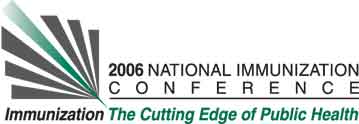Allison Kempe1, Matthew F. Daley
1, Lori A. Crane
2, Brenda L. Beaty
3, Shannon Stokley
4, Jennifer Barrow
3, Christine Babbel
3, Miriam Dickinson
5, Stephen Berman
1, and John F. Steiner
3. (1) Dept. of Pediatrics, Univ. of Colo. HSC, Children's Outcomes Research Program, The Children's Hospital, 1056 E. 19th Avenue, B032, Denver, CO, USA, (2) Dept. of Preventive Medicine & Biometrics, University of Colorado Health Sciences Center, 4200 E 9th Ave, Box B-119, Denver, CO, USA, (3) Colorado Health Outcomes Program, University of Colorado Health Sciences Center, P.O. Box 6508, F-443, Aurora, CO, USA, (4) National Immunization Program, Centers for Disease Control and Prevention, 1600 Clifton Road, NE, MS E-52, Atlanta, GA, USA, (5) Dept. of Family Medicine, University of Colorado Health Sciences Center, 4200 E 9th Ave, Box B-119, Denver, CO, USA
Learning Objectives for this Presentation:
Participants will be able to describe current pneumococcal vaccine delivery by internists and willingness to change practice if recommended.
Background:
Pneumococcal vaccine is currently recommended by ACIP for all adults >=65 years of age and adults <65 years of age with chronic illness.
Objectives:
To assess 1) current practice of general internists regarding pneumococcal vaccine, 2) barriers to vaccine delivery, and 3) willingness to comply with possible changes in vaccine recommendations.
Methods:
We conducted a survey in a network of general internists that is representative of the American College of Physicians membership.
Results:
Response rate was 75%. 84% strongly recommended vaccination to patients >=65 years of age and 67% to persons 18-64 years with chronic illness. 40% had a computerized method for identifying patients based on age or presence of chronic disease, although <20% currently used this capability. Barriers to vaccine delivery included: acute problems taking precedence over preventive care (39%), difficulty determining previous vaccination history (30%), inadequate reimbursement for vaccine (19%), patient refusal because of insurance not covering vaccine (19%), up-front costs of purchasing vaccine (14%) and patient safety concerns (13%). If ACIP recommended changing age criteria for healthy adults from 65 to 50 years of age, 60% of respondents reported they would definitely institute this change and 37% more would probably do so. Urban practitioners were more likely to comply, while those concerned about up-front costs of purchasing vaccine and acute problems taking precedence over preventive care as barriers were less likely to comply.
Conclusions:
Although most general internists report complying with current pneumococcal vaccine recommendations, their efforts are hindered by competing demands in primary care, problems identifying patients needing the vaccine, reimbursement issues and patient safety concerns. The majority report a willingness to vaccinate patients at 50 years if recommended by ACIP.
See more of Posters
See more of The 40th National Immunization Conference (NIC)

